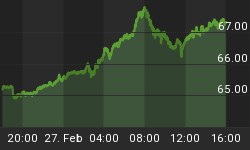So it seems as if the best thing that ever happened to the economy was the failure of Lehman Brothers and the seizing up of the capital markets.
I know that seems like a strange proposal. The credit market collapse clearly was a major stress event for the economy and greatly worsened the recession.
However, without the moment of crisis, it would be very hard to muster anything remotely encouraging to say about the recent economic data. The stock market is all agog because Payrolls are "only" contracting by 250k or 300k per month, and Initial Claims has fallen to the low level of 550k per week. It bears remembering that Initial Claims never were as high as 550k in the last recession, even in the wake of 9/11.
It is better to think of the Claims series, and other economic time series, as consisting of two components. One is a regular cyclical pattern whose amplitude depends on the severity of the recession given normal factors. The second is an idiosyncratic wave, a one-time perturbation caused by a strong event. Think about a rock dropped into a pond: at any point on the surface of the water you can think of the water height being the height prior to the stone being dropped, plus the ripple from the stone's impact; the ripple's effect diminishes as it gets further from the point of impact and is dampened.
So, for instance, in 2001 the "steady state" of Initial Claims seems to have been around 400k, but after 9/11 Claims spiked above 500k and then gradually declined over the next few months back to the 400k rate, where it sat for a while. The impact of the credit market seizure and Lehman bankruptcy (which was one symptom of the severity of the episode) was broader and more lasting, but is also fading. It is difficult to decompose the series into the natural cyclical trend of claims and the ebbing effect of the crisis (I am sure Charlie Eppes from the TV show "Numb3rs" could do it), but to get the general idea we can do something simple.
In the two charts below, I have simply taken the trend from the 6 months prior to the Lehman bankruptcy (on 9/15/08) and extended it. The first chart is of Initial Claims and the second chart is of Payrolls. What you can see from this - and you can draw similar pictures for many of the data series that have people so exercised about 'green shoots' is that these employment indicators are about where they would be, perhaps slightly better, than they would be if the economy had simply continued to worsen at the rate it was worsening prior to the Lehman collapse.

The second chart is the same analysis, on Payrolls. Again, there seems to be a slight improvement over the prior trend, but nothing to write home about.

Now, since we can't easily decompose the two effects in the manner I have described, it may be that the economy ex-Lehman-debacle is indeed improving off what would have been just a less-deep trough. However, in the last couple of recessions, the "flat part" lasted for quite a while. The initial rebound from the stressor (Gulf War in 1990-91; 9/11 in 2001, see chart below) was indeed pretty sharp...but then there was a long row to hoe.
I think we still need to hoe that row.
















